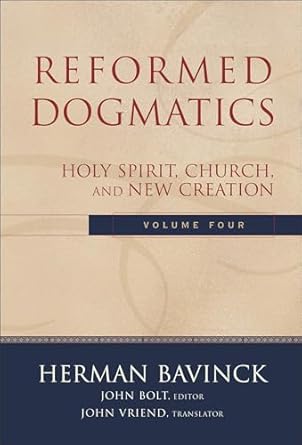A Brief Book Summary from Books At a Glance
by Steve West
Table of Contents
Part I: The Spirit Gives New Life to Believers
1. Calling and Regeneration
2. Conversion
3. Justification
4. Sanctification and Perseverance
Part II: The Spirit Creates New Community
5. The Church’s Spiritual Essence
6. The Church’s Spiritual Government
7. The Church’s Spiritual Power
8. The Spirit’s Means of Grace: Proclamation
9. The Spirit’s Means of Grace: The Sacraments
10. The Spirit’s Means of Grace: Baptism
11. The Spirit’s Means of Grace: The Lord’s Supper
Part III: The Spirit Makes All Things New
A. The Intermediate State
12. The Question of Immortality
13. After Death, Then What?
14. Between Death and Resurrection
B. The Return of Christ
15. Visions of the End
16. Israel, the Millennium, and Christ’s Return
C. The Consummation
17. The Day of the Lord
18. The Renewal of Creation
Summary
*Editor’s Note: This book is divided into two book summaries. The first summarizes Part I & Part II (Chapters 5 &6), and the second summarizes Part II (Chapters 7-11) and Part III. This is Parts I-II.
Part I: The Spirit Gives New Life to Believers
It is by the Word and Spirit that God creates everything in both this world and in the new creation. As a result, everything speaks to us as a revelation of God. In nature and in history, God’s call comes to all as law, and the gospel—which flows from grace—cannot be separated from nature and history even though it is distinguished from them. It is the incarnate Word through whom all things are made, and it is the incarnate Lord who commands that the call to faith be universally preached. Preachers do not preach the gospel as if to the elect or non-elect: they are to preach the gospel to sinners and leave the results in God’s sovereign hands. The offer of the gospel is universal, and it is a sincere offer since people are told to believe and be saved. Although there are many things we do not comprehend, we know that God’s ultimate concern is with his own glory and that his Word does not fail in its purpose or return void. Human free will cannot be the solution or answer as to why some are saved while others are not.
The law prepares the way for the gospel since it is the natural foundation in God’s created order for salvation. God’s work of salvation is accomplished in the economic relations of the Trinity. There is a general call of the gospel that goes out to all, but it is only the Spirit who can provide the efficacious call. Sin has so affected every person that it is only by the sovereign grace of God in regeneration that anyone can be saved. Although the concept of rebirth is found in different ancient religions, the biblical concept is unique. In both the Old and New Testaments, regeneration or rebirth is a sovereign act of God that gives someone a new heart and new spirit; it is being born again. In regeneration God radically transforms the individual internally so that they have spiritual life and are morally renewed to walk with God.
This new birth was symbolized and sealed by baptism. At first, baptism was a sign of having experienced regeneration, but when infant baptism became the practice of the church, the links between baptism and regeneration had to be reconfigured. In Rome and in the Eastern branch of the church, baptism was seen as essential for salvation, either because it infused grace (Rome) or implanted a seed of immortality (Eastern Orthodoxy). Those who were baptized were expected to remain in a state of grace through participation in the sacraments and by the mediation of the church. The Reformers rejected this view, denying that the Spirit’s work of regeneration required priests and sacraments. They maintained that the Spirit worked immediately in the individual’s heart. Anabaptists made personal faith the requirement for baptism, whereas Lutheranism moved back to baptismal regeneration. In the Reformed community, no consensus on the grounds for baptizing infants was at first achieved, but later agreement was reached on seeing both infants and believing parents as being members of the covenant of grace, and baptism was based on God’s covenant promises. After the Enlightenment, liberal theology set the doctrine of regeneration aside in favor of philosophies of moral growth and development. Schleiermacher saw regeneration as central but redefined it, rejected the doctrine of atonement, and made God-consciousness and mysticism vital in salvation. . . .
[To continue reading this summary, please see below....]The remainder of this article is premium content. Become a member to continue reading.
Already have an account? Sign In
